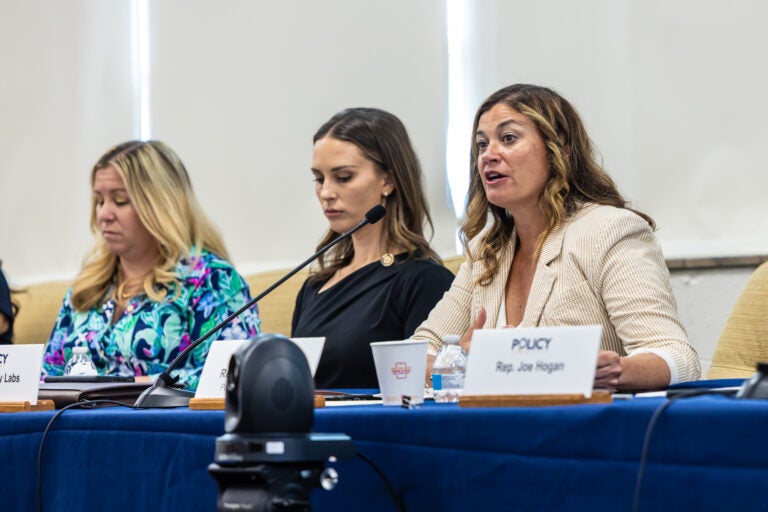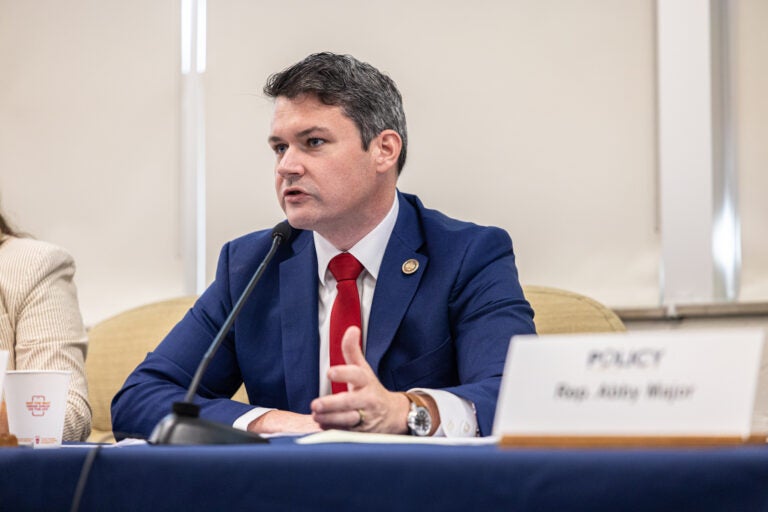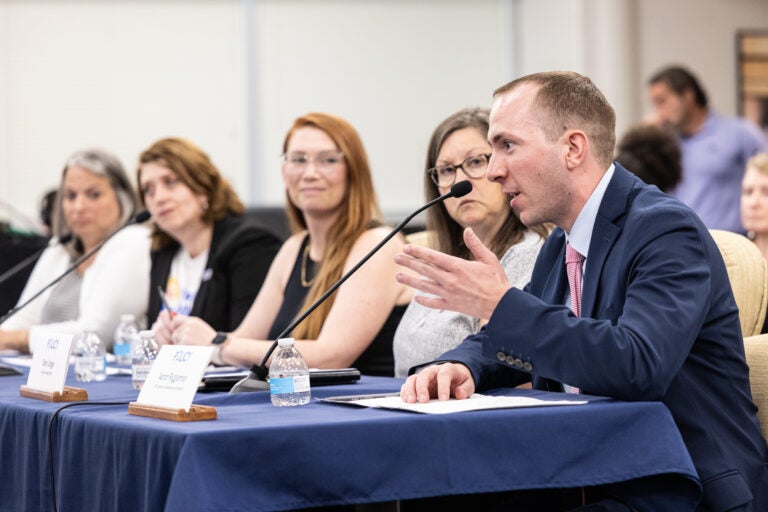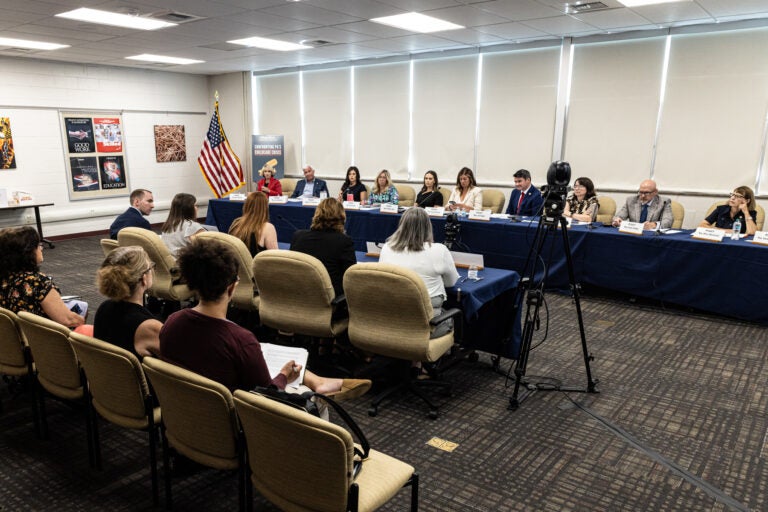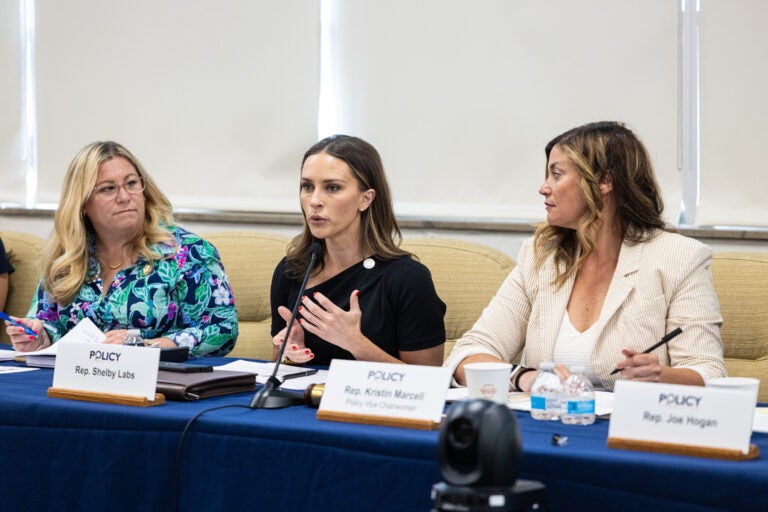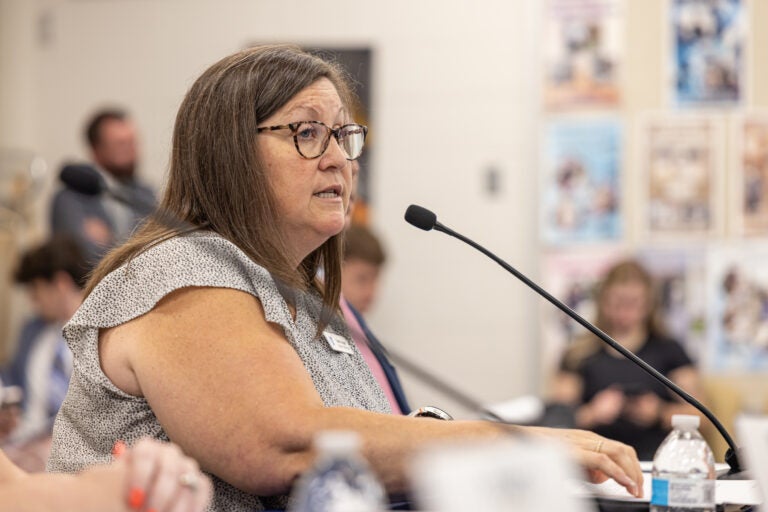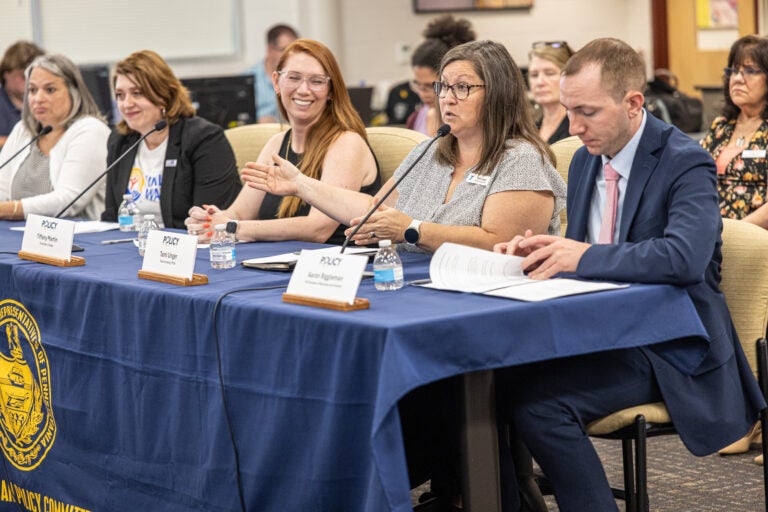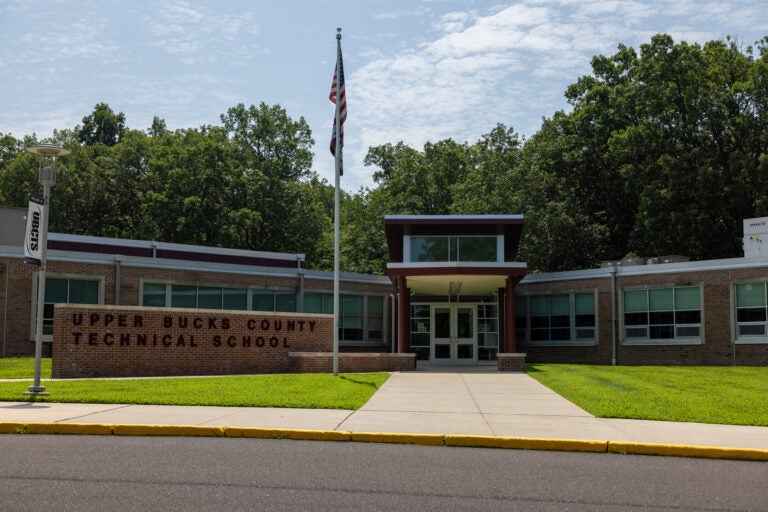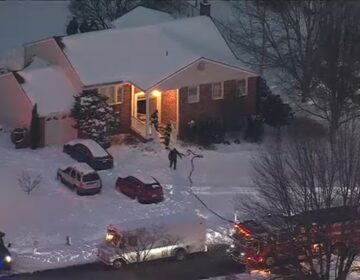Pennsylvania lawmakers say child care is broken, but don’t agree on how to fix it — yet
State lawmakers are promising changes to improve affordability for families, profitability for businesses and less debt for teachers by cutting red tape.
Listen 1:28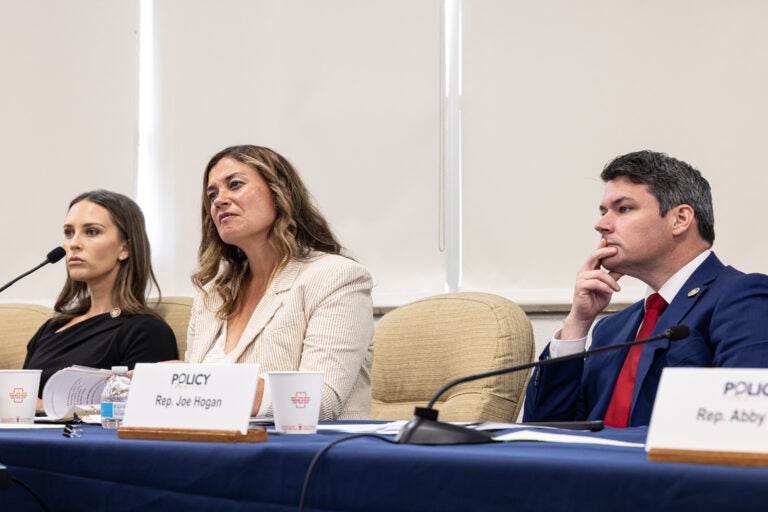
Bucks County Republican House members Shelby Labs (left), Kristin Marcell (center) and Joe Hogan (right) hosted a Pennsylvania House Republican Policy Committee hearing on challenges facing the child care industry in the state at Upper Bucks County Technical School in Perkasie, Pa., on July 29, 2025. (Kimberly Paynter/WHYY)
From Philly and the Pa. suburbs to South Jersey and Delaware, what would you like WHYY News to cover? Let us know!
Running an early learning center for Pennsylvania’s youngest students is more difficult than ever, operators told lawmakers at recent public hearings as the state considers big changes for the first time in nearly two decades.
“The math ain’t mathing anymore,” said Nicole Featherman, executive director of the LifeSpan School and Daycare, which has its main campus in Quakertown.
That’s because child care subsidies reimburse providers 75 cents for every dollar spent, at both the state and federal levels, Featherman told WHYY News in a recent interview.
“And the bulk of our budgets go to wages and benefits,” Featherman said. “We’ve seen a significant increase in costs since COVID-19 for benefits, insurance and some other things. Increased food costs, that’s pretty significant in an early childhood setting. The burden is becoming too hard for families.”
And it barely matters if that center is nonprofit, for-profit, privately run or publicly subsidized, operators said. None of the models are working for families, teachers, operators or children.
That point was highlighted again Tuesday during a public hearing at Upper Bucks County Technical School hosted by state House Republicans, who say they are tackling overregulation of the child care industry by leaning into deregulation and workforce development programs.
They say parents are paying the cost of a college tuition for infant care, while highly educated teachers who care for up to six infants at a time earn less than retail clerks at nearby gas stations or department stores, and that the centers where they work can’t afford to stay open on small margins.
Featherman, who oversees the early childhood centers in Lehigh, Montgomery and Bucks counties, said it can be maddening for teachers to work so hard for so little and leave, and for her to see how few people are interested in replacing them.
Her waiting list for new infants is lengthy. Some might say if she ran any other kind of business, it would be profitable.
What’s wrong with Pa. child care?
The workforce pipeline is particularly broken, advocates say. New teachers are rare because of low starting wages and high education requirements set by state regulations, while longtime workers must go back to school to qualify for management jobs in the industry despite having decades of experience.
“Due to the wage issue, there’s just a lot less people going into early childhood,” Featherman said. “The job has certainly gotten harder over the years with different child behaviors and allergies and the multitude of other things that we provide, we don’t have support for like school districts do.”
That support includes counselors and nurses on site — resources that are readily available in K-12 public schools, funded by property and income taxes.
Early learning employees in Pennsylvania, depending on their role, can be required to hold bachelor’s or even master’s degrees. To attract workers, LifeSpan offers a $1,000 sign-on bonus and a free college degree, according to its website.
For an assistant toddler teacher position in Allentown, the job posting advertises pay between $15 and $20 an hour, yet requires at minimum a child development associate certificate or associate degree.
While some argue a functioning child care industry is necessary for parents, others say it’s an economic problem that needs legal reform.
That’s because parents who can’t leave home due to a lack of child care options are contributing to an existing statewide labor shortage for any growing businesses — an issue that came to the forefront during the COVID-19 pandemic when schools shifted to remote learning while many parents worked from home.
“Due to the pandemic, everybody really saw the impact of child care and how critical it was,” Featherman said.
LifeSpan serves about 800 children across three counties, but about 15% of its teaching positions remain unfilled. Featherman estimates that the centers could serve another 100 families if those jobs were filled.
Efforts by lawmakers and businesses
This year, more than 70 local business chambers across Pennsylvania signed a letter to state lawmakers asking both Republicans and Democrats to allocate state money to help support child care teachers with taxpayer subsidies.
Robert Carl Jr., CEO of the Schuylkill Chamber of Commerce, led the effort. Five years ago, when he surveyed businesses about their top issue, child care was not near the top of that list — but said that now it’s No. 1.
“If we say we want to be the greatest state economically and in workforce development,” Carl Jr. said, “then we have to support child care.”
Democratic Gov. Josh Shapiro’s budget earmarked $55 million for the child care industry, including a $1,000 subsidy per teacher as retention pay. But Republicans argue that it won’t solve the underlying systematic issue, nor that the money would reach all child care centers because it’s only for those that participate in the state’s subsidized program, Child Care Works, which accepts waivers for low-income families and is managed by Early Learning Resources Centers at the county level.
Another $10 million would be set aside for the Department of Human Services to increase the Early Intervention Provider rates that would not be tied to family income.
“The governor has made that initiative happen. That’s why we’re working hard to get this across the finish line. This is the first major initiative in child care in 18 years,” Carl Jr. said.
A House version of the state budget includes such provisions. But it’s unclear whether it would pass the Senate, which is controlled by Republicans. The state GOP did sign on to increase the state’s child tax credit program, but worker subsidies were criticized as “throwing money at the problem” and a one-time fix rather than a sustainable change.
Instead, state Rep. Kate Klunk, a York County Republican who chairs the House Children and Youth Committee, said the industry needs a major overhaul.
“The $55 million the governor is proposing is truly a Band-Aid and we have bullet holes in our system right now,” Klunk said. “Throwing money at a complicated problem is not the solution we need to get creative.”
One such approach would be a pilot program pitched in a legislative memo by Bucks County state Rep. Shelby Labs, a Republican. A bill has not yet been introduced. Rep. Labs, a mother of two, said child care is not a partisan issue.
“This child care issue is not a partisan issue. It affects all of our businesses … all of our families and that’s where we should be focusing, how we can help foster our students to be able to grow in their chosen career path and how we can help our families have attainable, reliable child care,” Labs said. “Putting money towards this pilot would allow students to access funding that would allow them to further their career.”
Both Labs and Klunk disagree with the governor’s plan and instead want deregulation, tax credits and dual enrollment programs. The dual enrollment program would allow teachers to graduate “debt free” and begin working in the industry after high school, having earned enough credits for an associate degree.
During the public hearing Tuesday, Tami Unger, branch director of the River Crossing YMCA, testified about regulations and ways the state can improve the situation.
Unger told WHYY News that demand for child care has risen in recent years.
“There’s a lot of two-parent working households that require child care. Unfortunately, for many reasons, there’s a lack of accessible child care around. Many smaller child care centers are just not able to stay in business anymore,” she said.
Unger said she can’t keep her teachers because she can’t afford to pay them enough.
“Many of our teachers and our programs have to have the same credential as public school teachers, but there’s a gap in between what we’re able to pay,” she said. “The first five years of life is when their brain develops. [For teachers] it’s not a part-time job, but it’s a career.”

Get daily updates from WHYY News!
WHYY is your source for fact-based, in-depth journalism and information. As a nonprofit organization, we rely on financial support from readers like you. Please give today.


